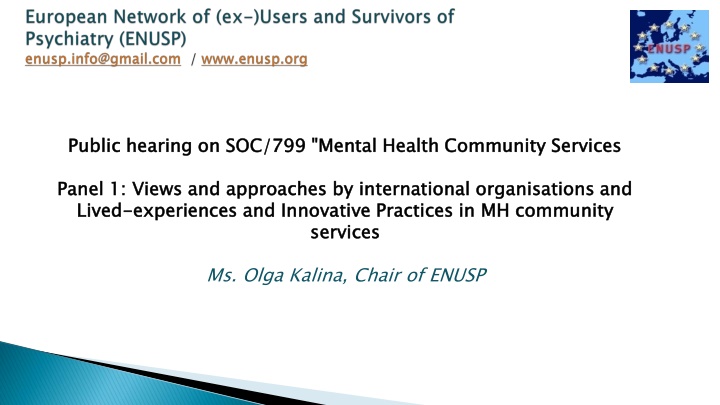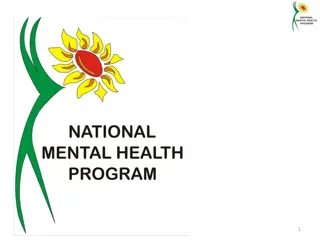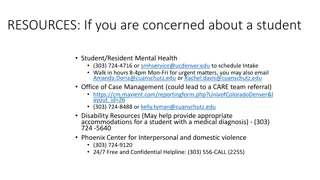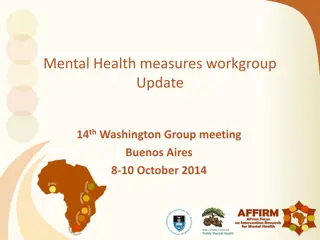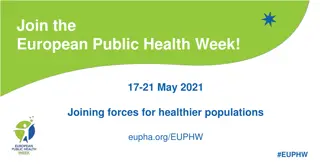Challenges and Innovations in Mental Health Community Services within European Countries
The European Network of (Ex-)Users and Survivors of Psychiatry, consisting of 36 member organizations across 28 European countries, is advocating for improved mental health care systems. They are addressing issues such as forced hospitalizations, coercive measures, and the trauma experienced by individuals receiving psychiatric treatment. Thematic consultations and recommendations by ENUSP are influencing policy discussions at both national and European levels.
Download Presentation

Please find below an Image/Link to download the presentation.
The content on the website is provided AS IS for your information and personal use only. It may not be sold, licensed, or shared on other websites without obtaining consent from the author.If you encounter any issues during the download, it is possible that the publisher has removed the file from their server.
You are allowed to download the files provided on this website for personal or commercial use, subject to the condition that they are used lawfully. All files are the property of their respective owners.
The content on the website is provided AS IS for your information and personal use only. It may not be sold, licensed, or shared on other websites without obtaining consent from the author.
E N D
Presentation Transcript
enusp.info@gmail.com www.enusp.org Public hearing on SOC/799 "Mental Health Community Services Public hearing on SOC/799 "Mental Health Community Services Panel 1: Views and approaches by international organisations and Lived services Panel 1: Views and approaches by international organisations and Lived- -experiences and Innovative Practices in MH community services experiences and Innovative Practices in MH community Ms. Olga Kalina, Chair of ENUSP
36 member organisations in 28 European countries Northern Region: North East Region: North West Region: Central Region: South West Region: South East Region: Northern Region: Denmark, Finland, Iceland, Norway, Sweden North East Region: Latvia, Lithuania, Russia, Ukraine North West Region: Germany, Ireland, the Netherlands, United Kingdom Central Region: Czech Republic, Moldova, Poland, Romania, Slovakia South West Region: Belgium, France, Italy, Portugal, Spain South East Region: Bosnia & Herzegovina, Georgia, Greece, Serbia, Slovenia
The second review of the EUs implementation of the UN CRPD by the UN Committee on the rights of persons with disabilities is underway and should take place next year. The European Network of (Ex-)Users and Survivors of Psychiatry has held thematic consultations via dissemination of questionnaires and online discussions with our members in EU states Objectives: Information from members on Improvements Barriers based on the opinion and lived experiences of ENUSP s members with regard to their rights in the mental health care system throughout the EU and to discuss our recommendations
France: We consider forced hospitalization as violence and abuse, and a cause of severe traumatization People may come back with sleep problems, nightmares, fear and dissociation (PTSD). Some people may never understand what happened to them and even build false interpretations, because the medical violence they endured is unbelievable. France: Note: 95,473 persons were hospitalized without their consent and 39,244 were under Community Treatment Orders (CTO) in 2021 Germany: During my worst psychotic episodes, I was treated like a villain, like an outsider and with force. Examples [of coercive measures] are restraint, giving me medication without my understanding of what I was taking Germany:
https://www.fa cebook.com/wa tch/?ref=saved &v=937404826 659713
I was once forcefully kissed by a man [in a psychiatric institution]. After that a nurse came up to me and asked me to stay away from this man because he has a wife and children. Although I was in a very vulnerable state because of my acute psychosocial disability, I was blamed for the act of sexual harassment. In a clinic where I spent my rehabilitation, there was a special area for women who have suffered from sexual harassment by men to offer them a safe space. That was a very positive experience to see. Forced sterilization of persons with disabilities is still explicitly allowed in Bulgaria, Croatia, Cyprus, Czechia, Denmark, Estonia, Finland, Hungary, Latvia, Lithuania, Portugal and Slovakia according to the analysis of the European Disability Forum. The UK protocol on isolation in mental health departments requires women be placed there without underwear and with no access to toilet paper or menstrual supplies. According to women, sometimes they are undressed and put in isolation rooms by male staff.
Lack of trust, more self-stigma, normalization of violence, trauma, self-harm, dissociation, suicide, more isolation, fear of healthcare system, fear of police, more vulnerability to violence and threats in order to avoid contact with the system, etc.
Psychiatric hospitals - small group homes Any real change in culture?
First Principle- Do No Harm We far too often find MHS dehumanizing and disrespectful of our rights and autonomy. Or unable to meet our needs! Staff attitudes Firstly, some people should never work with marginalized, vulnerable people- and yet all of us have encountered abusive individuals, and most with too much power, who do damage Secondly, it is morally mandatory that staff get on board to recognize their sane privilege and learn how to be genuine allies in the work of eliminating coercive power over our lives, bodies and mental distress experiences. Hence, we survivors, collaborate in initiatives to help build staff agency to make services more human rights focused and literate. Share resources equitably and support independent peer spaces.
Respite Houses Wildflower Alliance, Massachusetts USA: https://wildfloweralliance.org/afiya Leeds 24/7 crisis house UK https://leedsoasis.com/ The person is in control of their journey in these spaces. Galway Community Caf - https://youtu.be/6UjpaReSIck?si=DNy QV0Z9A6RgmZld
Importantly, individuals with lived experience should no longer be excluded from the solutions that impact their health and well-being. Stakeholders in global public health should therefore find new forms of multistakeholder collaboration to develop effective, contextually appropriate solutions to accelerate action and improve health outcomes.
Is the EU really walking the talk? Communication from the Commission to the European Parliament, the Council, the European Economic and Social Committee and the Committee of the Regions on a comprehensive approach to mental health (June 2023) - Lack of involvement of stakeholders - Gap between mental health and disability related topics - Our true priorities not focused on ex. loneliness versus eliminating coercion, full and equal legal capacity, training of professionals on human rights - Evaluation: which indicators/criteria who decides? - Understanding of last resort measures as a norm discourages research and funding needed to scale up new/alternative good practices
Equitable inclusion of individuals with lived experience in a range of processes and activities within an enabling environment where power is transferred to people; valuing lived experience as a form of expertise and applying it to improve health outcomes. Our participation will make the difference user/survivor-led Be aware of instrumentalization - Not a token role! Leaving the role of poor sick person needing protection" to always being an active and involved "citizen".
Thank you for your attention! E E- -mail: Website: mail: enusp.info@gmail.com Website: www.enusp.org enusp.info@gmail.com www.enusp.org
